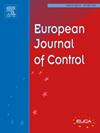A robust trajectory tracking controller for a magnetic system: A sliding mode-based approach
IF 2.5
3区 计算机科学
Q2 AUTOMATION & CONTROL SYSTEMS
引用次数: 0
Abstract
A robust control strategy is developed to address the position trajectory tracking problem in a perturbed magnetic levitation system. The system consists of two electromagnets, each controlled by its respective input voltage. To enhance the model’s complexity, perturbations are introduced into the electrical and mechanical subsystems. The controller design begins under the assumption of a disturbance-free system. Subsequently, an integral sliding mode controller (ISMC) is incorporated to compensate for matching disturbances initially excluded from the model, and a super-twisting observer (STO) is employed to estimate and reject disturbances affecting the mechanical dynamics. The proposed control strategy enforces the convergence of two invariant manifolds to the origin. The first manifold ensures the asymptotic convergence of the position-tracking error to zero, while the second stabilizes the magnetic system and prevents magnetic flux saturation and singularities. The stability properties of the closed-loop system are rigorously analyzed using Lyapunov-based methods, ensuring robustness against bounded disturbances. Numerical simulations are conducted to evaluate the performance of the control scheme, demonstrating its efficacy in achieving precise trajectory tracking and disturbance rejection under the imposed perturbations.
磁系统鲁棒轨迹跟踪控制器:一种基于滑模的方法
针对摄动磁悬浮系统的位置轨迹跟踪问题,提出了一种鲁棒控制策略。该系统由两个电磁铁组成,每个电磁铁由各自的输入电压控制。为了提高模型的复杂性,在电气和机械子系统中引入了摄动。控制器的设计是在无扰动系统的假设下开始的。随后,引入积分滑模控制器(ISMC)来补偿最初从模型中排除的匹配干扰,并使用超扭转观测器(STO)来估计和抑制影响机械动力学的干扰。所提出的控制策略使两个不变流形收敛到原点。第一个流形保证了位置跟踪误差渐近收敛于零,第二个流形稳定了磁系统,防止了磁饱和和磁奇点。采用基于李雅普诺夫的方法严格分析了闭环系统的稳定性,保证了系统对有界扰动的鲁棒性。通过数值仿真来评估该控制方案的性能,证明了该控制方案在施加扰动的情况下能够实现精确的轨迹跟踪和抗干扰。
本文章由计算机程序翻译,如有差异,请以英文原文为准。
求助全文
约1分钟内获得全文
求助全文
来源期刊

European Journal of Control
工程技术-自动化与控制系统
CiteScore
5.80
自引率
5.90%
发文量
131
审稿时长
1 months
期刊介绍:
The European Control Association (EUCA) has among its objectives to promote the development of the discipline. Apart from the European Control Conferences, the European Journal of Control is the Association''s main channel for the dissemination of important contributions in the field.
The aim of the Journal is to publish high quality papers on the theory and practice of control and systems engineering.
The scope of the Journal will be wide and cover all aspects of the discipline including methodologies, techniques and applications.
Research in control and systems engineering is necessary to develop new concepts and tools which enhance our understanding and improve our ability to design and implement high performance control systems. Submitted papers should stress the practical motivations and relevance of their results.
The design and implementation of a successful control system requires the use of a range of techniques:
Modelling
Robustness Analysis
Identification
Optimization
Control Law Design
Numerical analysis
Fault Detection, and so on.
 求助内容:
求助内容: 应助结果提醒方式:
应助结果提醒方式:


